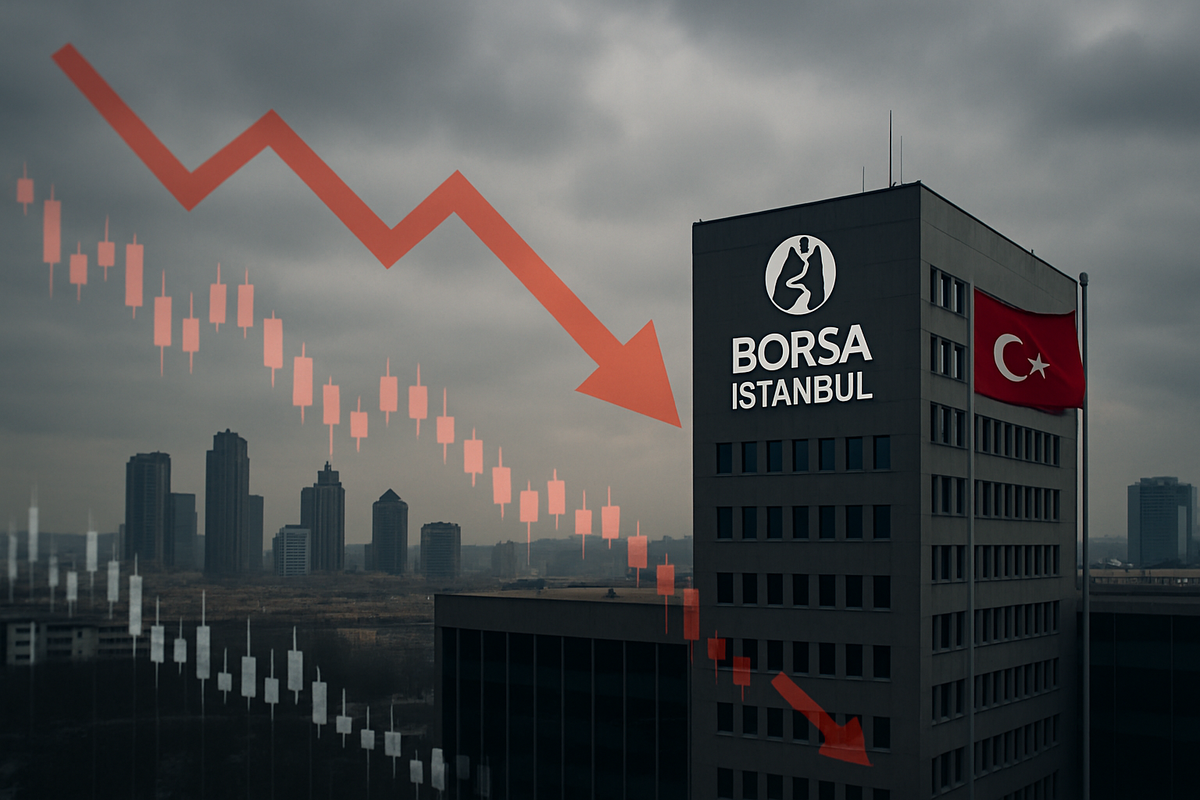Financial News
Turkish Stocks Tumble: BIST 100 Dips 2.02% Amid Inflation Fears and Policy Scrutiny

The Istanbul Stock Exchange (BIST) 100 index concluded trading on Friday, October 3, 2025, with a significant downturn, registering a 2.02% decline to close at 10,925 points. This considerable drop reflects a day of broad-based losses across several key sectors, signaling heightened investor caution and profit-taking in the Turkish financial markets. The immediate implications point to a challenging environment for Turkish equities, with a clear sentiment of "lower" prevailing among investors.
This market correction comes amidst growing investor anxiety ahead of crucial inflation figures and in the context of persistent economic challenges. The widespread nature of the sell-off, with 386 issues declining against only 200 advancing, underscores a pervasive shift in investor sentiment, impacting a wide array of public companies trading on the exchange.
Detailed Coverage of the Market Slide
The 2.02% plunge in the BIST 100 on October 3, 2025, was primarily driven by substantial losses observed across critical sectors, notably Leasing & Factoring, Wood, Paper & Printing, and Banking. These sectors experienced the most pronounced selling pressure, contributing significantly to the overall index's depreciation. This indicates a targeted withdrawal of capital from areas perceived as more vulnerable or less attractive in the current economic climate.
Among the session's most affected public companies were Destek Finans Faktoring AS (IS:DSTKF), which saw its shares plummet by a staggering 10.00%. Haci Omer Sabanci Holding AS (IS:SAHOL), a prominent industrial conglomerate, also faced a significant setback, declining by 5.95%. Emlak Konut Gayrimenkul Yatirim Ortakligi AS (IS:EKGYO), a major player in the real estate sector, concluded the day down 5.75%. These sharp declines highlight the concentrated impact on specific large-cap and sector-leading entities.
The market downturn on October 3rd did not occur in isolation. It follows a period of heightened volatility, including a nearly 6% loss for the BIST 100 in September 2025. That earlier decline was largely attributed to mounting political tensions, specifically a court ruling concerning the Republican People's Party's (CHP) 2023 Istanbul provincial congress, which injected uncertainty into the political landscape. Furthermore, a higher-than-expected August 2025 inflation reading, hitting 32.95%, fueled investor speculation that the Turkish central bank might have limited flexibility for future interest rate cuts, thereby dampening enthusiasm for equities.
Despite the prevailing bearish sentiment, a few public companies managed to defy the trend. Ipek Dogal Enerji Kaynaklari Arastirma ve Uretim AS (IS:IPEKE) notably surged by 6.00%, reaching all-time highs, indicating strong investor confidence in the energy sector or this specific company's fundamentals. Efor Cay Sanayi Tic AS (IS:EFORC) also recorded a respectable gain of 5.02%. In the currency markets, the Turkish Lira experienced a slight weakening, with the USD/TRY exchange rate rising 0.27% to 41.68 and the EUR/TRY increasing 0.30% to 48.99, reflecting broader economic pressures alongside the equity market's struggles.
Companies Navigating the Downturn: Winners and Losers
The 2.02% dip in the BIST 100 on October 3, 2025, casts a spotlight on the varying vulnerabilities of public companies operating within Turkey's complex economic landscape. Given the immediate sector-specific losses, the Leasing & Factoring and Banking sectors are poised to bear the brunt of such a market correction. Companies within the Leasing & Factoring sector, already sensitive to central bank policy rate increases that curb demand for their services, face increased impairment charges amidst an economic slowdown. Destek Finans Faktoring AS (IS:DSTKF), which plummeted 10.00% on the day, serves as a stark example of this acute sensitivity.
The Banking sector, a perennial bellwether for the Turkish economy, also experienced significant pressure. Major banks like Akbank (IS:AKBNK) and Yapi Kredi Bank (IS:YKBNK) are particularly susceptible to shifts in investor confidence, geopolitical tensions, and the impact of a weakening Lira on foreign currency-denominated corporate debt. While the sector has demonstrated resilience through improved profitability and regulatory reforms, continued uncertainty around interest rate policies and reliance on short-term external debt make them vulnerable to sudden market shifts and could negatively impact their net interest margins and return on equity.
Beyond these directly impacted financial sectors, Industrial Conglomerates and Consumer Goods Companies also face considerable headwinds. Diversified holdings like Haci Omer Sabanci Holding AS (IS:SAHOL), which saw a 5.95% decline, are exposed to weakening domestic and export demand, rising production costs, and intensified competition across their industrial arms. Similarly, consumer goods giants like BIM Birlesik Magazalar AS (IS:BIMAS) grapple with eroded purchasing power due to persistent high inflation and lower real wages, which inevitably translates to reduced sales volumes and pressure on profit margins, even for essential goods.
Conversely, some sectors and companies might prove relatively more resilient or even find opportunities amidst the downturn. The Utilities sector, for instance, often considered defensive, is projected to see strong annual earnings growth, potentially offering a haven for investors seeking stability. The Communication/Telecom sector has also shown relative strength in recent market movements, possibly due to the essential nature of their services making them less susceptible to economic fluctuations. While no sector is entirely immune to a broad market decline, strategic positioning or inherent market characteristics can mitigate the adverse effects, offering a nuanced view of "winners" in a generally challenging environment.
Wider Significance: Navigating Turkey's Economic Crosscurrents
The 2.02% decline in the BIST 100 on October 3, 2025, extends beyond a mere daily fluctuation; it serves as a critical indicator within Turkey's ongoing narrative of economic rebalancing and its position in the broader global financial landscape. This market movement reflects a delicate interplay of persistent domestic challenges and evolving international investor sentiment.
Domestically, Turkey continues its arduous battle against inflation, with the annual rate for September 2025 edging up to 33.29%, surpassing market expectations and signaling the first rise in 15 months. This stubbornly high inflation, particularly in services, underscores strong domestic demand and wage indexation, suggesting its increasingly endogenous nature. While the Central Bank of the Republic of Turkey (CBRT) has maintained a tight monetary stance, evidenced by significant rate hikes in 2023-2024, its recent rate cuts (to 40.50% in September 2025) introduce a layer of complexity. The market decline could reflect investor nervousness regarding the sustainability of the disinflation process or renewed concerns about the Lira's stability, despite the CBRT's record-high total reserves of $182.95 billion on the same day. The Lira's volatility, with forecasts of a 12-15% depreciation against the USD by year-end, remains a constant concern, impacting import-reliant industries and corporate foreign currency debt.
Globally, the event resonates within the context of emerging market (EM) dynamics. While the general outlook for EMs in 2025 is somewhat positive, anticipating strong growth and easing interest rates, volatility remains a key characteristic. A downturn in a significant EM like Turkey can prompt a reassessment of risk across other emerging economies, particularly those with similar vulnerabilities such as high inflation, current account deficits, or geopolitical sensitivities. Specific Turkish industries, particularly those dependent on imported raw materials, face increased pressure from a depreciating Lira, which can harm profitability and stock prices. Conversely, foreign investor sentiment, which showed increased interest in Turkish stocks earlier in 2025, could be tempered by such declines, especially if concerns about policy reversals or currency volatility persist.
From a regulatory and policy standpoint, this market dip places renewed scrutiny on the Turkish government and the CBRT. Should the decline signal deteriorating inflation expectations or further Lira weakness, the central bank might be compelled to reconsider its monetary easing path, potentially maintaining a tighter stance or even resuming rate hikes to anchor expectations and prevent capital flight. The government's commitment to fiscal discipline and structural reforms, as outlined in its Medium-Term Program, becomes even more critical. Historically, Turkey's stock market has been highly sensitive to political tensions, inflation, and Lira depreciation, with past events seeing significant BIST 100 drops tied to political developments or foreign investor sell-offs. The current market movement, therefore, serves as a timely reminder of these inherent sensitivities and the critical need for transparent and consistent communication from policymakers to reassure investors.
What Comes Next: Navigating the Path Ahead
The 2.02% decline in the BIST 100 on October 3, 2025, sets the stage for a period of both challenges and potential opportunities in the Turkish financial markets. In the short term, increased volatility is highly probable, driven by ongoing political risks, the prospect of elevated interest rates, and continuous scrutiny of inflation data. The recent rise in September's inflation to 33.29% (above forecasts) could compel the Central Bank of the Republic of Turkey (CBRT) to re-evaluate its pace of interest rate cuts, any hesitation of which would likely exert further downward pressure on equity markets. Market analysts are closely watching the 10,900-10,925 level on the BIST 100, as a sustained break below it could trigger deeper corrections, while holding above it might signal a rebound.
Looking into the long term, the outlook is shaped by Turkey's ability to achieve sustained disinflation and implement structural reforms. If the CBRT successfully steers inflation towards its 2025 and 2026 targets, it could foster a more stable monetary environment, rebuilding investor confidence. Moderate economic growth, projected by international organizations like the IMF and World Bank, alongside Turkey's strategic location and investment incentives, could attract renewed foreign capital inflows. Historically, domestic investors have also viewed stocks as a hedge against inflation, a trend that may persist if price pressures remain elevated.
Public companies in Turkey face the imperative of strategic pivots and adaptations. Robust inflation and currency risk management strategies are paramount, encompassing careful balance sheet management and hedging to mitigate the impact of high costs and Lira volatility. Companies must also prioritize enhanced competitiveness and innovation, particularly in medium-to-high technology sectors, and accelerate digital transformation. Integrating ESG principles is becoming crucial for attracting capital, and economic pressures may lead to increased Mergers and Acquisitions (M&A) activity, offering opportunities for strategic growth or restructuring. Sector-specific focus will be key, with banking, real estate investment trusts (REITs), telecommunications, aviation, defense, cement, and energy industries potentially benefiting from policy shifts and economic trends.
Comprehensive Wrap-Up: A Market at a Crossroads
The 2.02% decline in the BIST 100 on October 3, 2025, serves as a critical reminder of the Turkish market's inherent sensitivity to inflation, currency dynamics, and policy uncertainties. Key takeaways from this event underscore persistent macroeconomic challenges, particularly the battle against stubborn inflation, and the delicate balancing act required of the CBRT in its monetary policy decisions. The market sentiment, while showing pockets of cautious optimism from foreign bond inflows and government reform commitments, remains largely guarded, reflecting formidable macroeconomic risks.
Moving forward, the market's direction hinges on the efficacy of Turkey's current economic policy mix in achieving disinflation and maintaining financial stability. The lasting impacts of such a decline, especially if linked to negative economic news, include potential erosion of investor confidence, increased market volatility, pressure on corporate earnings from high costs, and exacerbated currency pressures. These factors collectively highlight a market at a crossroads, where decisive policy action and consistent communication are paramount.
Investors should closely monitor several key indicators in the coming months. Foremost among these are inflation data and the CBRT's monetary policy decisions, particularly regarding interest rates and their commitment to price stability. The Turkish Lira's stability against major currencies will be a crucial barometer of market confidence. Furthermore, vigilance over fiscal policy and consolidation efforts, foreign capital flows, corporate earnings, and geopolitical/domestic political developments will be essential for navigating the complex Turkish financial landscape. The interplay of these factors will ultimately determine the market's trajectory and whether Turkey can successfully transition towards a more stable and predictable economic environment.
This content is intended for informational purposes only and is not financial advice
More News
View More





Quotes delayed at least 20 minutes.
By accessing this page, you agree to the following
Privacy Policy and Terms Of Service.



